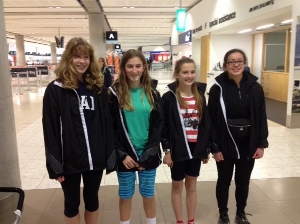
Sarah Bealing, Abby Croot, Suzanna Davis and Aisha O’Malley will be presenting solutions around their competition topic of ‘Space’.
The Future Problem Solvers from Selwyn House completed three different problem booklets during 2013. Each booklet was evaluated and scored by trained evaluators. Teams within each of the three age divisions were invited to the national finals in Auckland in November based upon their scores during the year. The girls won Year 8 Division of Future Problem Solving at the National Finals.
The team has now gone to the International Conference, being held this year at Iowa State University, to compete against the best teams in North America, Australia, New Zealand and South Korea. Selwyn House students have placed at international championships on a consistent basis.
Coach Linda Baran explains how the girls have been preparing for the challenge ahead.
“As the topic is broad, we have prepared by breaking the topic down to key areas and working with a shared document on GoogleDrive so research can be added under the headings. The headings have included space exploration, space business and industries such as asteroid mining and space tourism, economics of space exploration, global collaboration and tensions, space colonisation and technologies resulting from space exploration. The girls have attended open evening university lectures, watched documentaries and read quality science fiction, which is often well-researched and provides futuristic ideas.
“Future Problem Solving has been influencing me since Year 5,” team member Aisha O’Malley says.
“It’s not just the teamwork skills or the problem solving, although they help. It’s the future thinking and research into so many different topics that has taught me so much about the world today. I probably wouldn’t have gained this knowledge until much later but thanks to FPS, I’ve had it since the day I started the programme at Selwyn House.”
Today’s students will live most of their adult lives in the 21st century, Ms Baran says.
“As our society changes more quickly now than at any previous time in history, we face the awesome burden of preparing today’s students for the uncertainties of the new millennium. We cannot hope to provide students with all the information they will need to survive in the future, but we can help them develop the thinking skills necessary to adapt to a changing world. Problem solving is an important curriculum matter that needs to be addressed as part of a curriculum designed to provide a sound base for study.”
Each year Future Problem Solvers from Selwyn House participate in the New Zealand Future Problem Solving Programme. The girls are not only developing skills in creative problem solving and futures, but also in several other vital areas of education.
The Christchurch students are learning group interrelationship skills as they work in a team to find solutions to future problems; they develop skills of organisation and coherence through both written and oral communication; and they develop higher level thinking skills that will help them deal with problems of global magnitude as well as those on a more personal decision-making
Educators and politicians are trying to address the current teaching shortage through different policy settings.…
Melanie Webber was the president of the secondary school union PPTA Te Wehengarua from 2021…
Wait times for paediatric care is having an impact on young people’s education and the…
Home of the brave, land of the free… except when it comes to books for…
Could a gender achievement gap in maths be due to confidence? Sarah Buckley from the…
The much-delayed English draft curriculum is now out for consultation, generating discussion from teachers.
This website uses cookies.